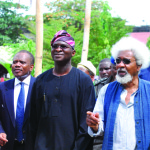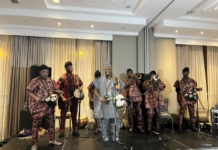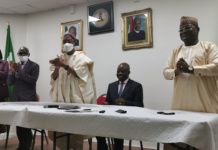
By Peter Olorunnisomo in London: The Lagos Black Heritage festival was inaugurated in 2010 in Lagos and has added fillip to festival-rich culture of Lagos State and indeed, Nigeria. The Festival, by its advent, is the latest to embroil a carnival nature with an ‘international’ integration.
This festival, which going by the rich history of socio-cultural integration of Lagos as a settlement, makes certain pronouncements about the Brazilian component of the Lagos culture and persona. A cursory look into the heartland of Lagos would reveal ancestories with names like Da Silva, Silva, Do Santos, Muniz, Da Rocha, etc to mention a few. These are not homogenous names that belong to the Yoruba ancestry but names that showed that the Brazilian presence in the Lagos colony from way back several centuries ago before the advent of the slave trade. This is perhaps what has pro-sited the festival celebrations to the Lagos metropolis and Badagry, the ancient slave port and post.
The festival thus takes on, therefore, the fanfare which is characteristic of Lagosians but adds the flavor of the Brazilian and Portugese stock. It has thus been given a dimension of the carnivals of Rio de Janeiro and Costa Rica. Perhaps one of the strongest statements being made here is the ancestries of these families who have founded themselves in Lagos by some act of fate and have remained for several generations such that even by Laws of Citizenship in the land and cultural affinities, they have become Lagosians.
But that is not where the similarities end, it goes further to the areas of cultural beliefs where ancestral deities and traditional worship methodologies have immense similarities till today. Such Yoruba deities as Sango, Oya, Osun, and the Ifa divinity are pronounced features of the Brazilian heritage. These are only a few of the core features where Brazil meets Lagos.
The chairman of this year’s festival organizing committee is Nobel Laureate, Prof. Wole Soyinka, a doyen of Nigerian art and culture had pointed that all logistics to assure a successful event had been put in place. Straight on his heels is the Honourable Commissioner for Tourism and Intergovernmental Relations, Mr. Disun Holloway, who sits as the eyes of the State government as Chairman of the Carnival Committee. Mr. Holloway noted that the festival would immensely benefit residents in the state and foreigners who would find tourist value in the state government-backed project.
The week long activities of the festival which starts on the 23rd March, 2013 and ends on the 1st April, 2013 will feature activities such as drama (street theatre), boat regatta, exhibitions, film shows, carnival parades, masquerades, Food fair, with performances from Rwanda, Afro-Brazilian ensemble; Osun, Ondo, and Ekiti States of Nigeria. Also are the Badagry day with Gelede masquerade displays, the Bariga kids (a district area of Lagos), and homage expose of Abdias do Nascimento a literary icon of the Brazilian who stock whose contribution to the African consciousness got him nomination for a Nobel peace laureate. He died in May, 2011.
It is quite evident that the celebration of this unique festival is actually of a peoples who conjoined by chance, circumstance and culture and who have come to understand the neo-colonial virtues of people of unity. This, perhaps, reflects why the celebration id fed with the abundance of cultural creativity capped by the very acknowledgement of such an icon as do Nascimento. The relative values of lineages and culture that will not be buried in the contemporary scheme of everyday life in a cosmopolitan city like Lagos certainly deserves to be celebrated.
The heartland of Lagos, referred to as Lagos Island, or the Eko itself is the settlement area of the Brazilian peoples and the place where the advantages of co-existence, and cultural integration has facilitated all to refer to Lagos as their homestead.
The historical value of the festival is acutely brought to the fore with performances of the Eko brass band and Duro Ladipo Theatre with the world renowned performance of the tragic epic, Obakoso.
There is no other expectation of this cultural evolution of the racial integration and identity than to expect such a melting of minds, peoples, cultures, and a celebration backed by government as a new order of development in the world. It therefore should not die any death but live to give heritage to a people bonded by fate. Thanks to the political dexterity, consciousness and maturity of the Lagos State Governor, Babatunde Fashola, SAN.







